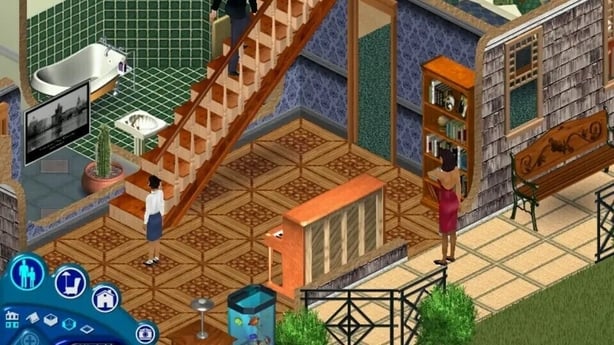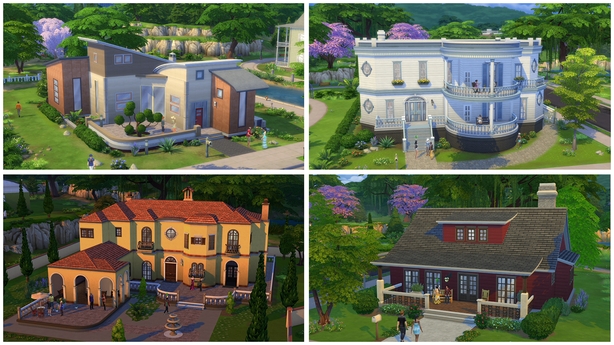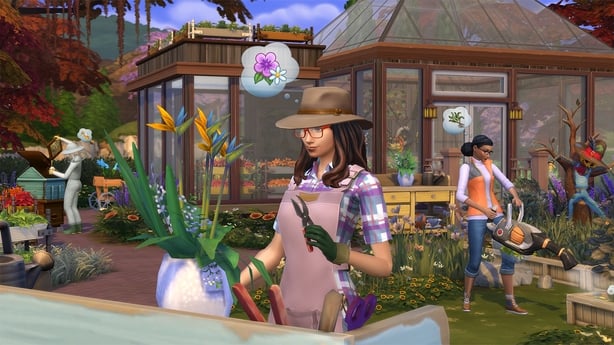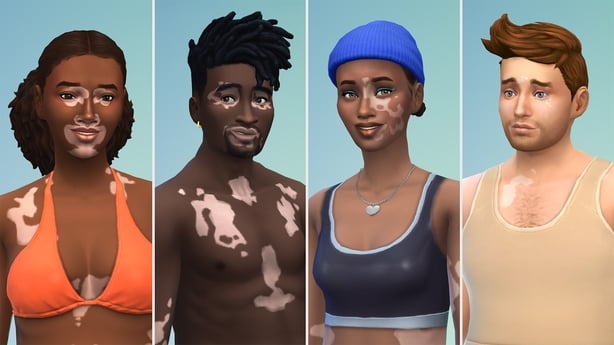With hundreds of millions of sales and legions of die-hard fans, The Sims remains one of the greatest franchises in entertainment today.
A trailblazer in inclusivity and creativity, a simple video game about virtual life has transformed the gaming industry forever.
And with a Sims movie (involving Margot Robbie) currently in the works, the cultural phenomenon may be turning 25 – but by all accounts, it's only just getting started.
One of the most popular games in the world
Released in February 2000, the original Sims was a revolutionary sandbox experience. The game bravely trusted players to craft their own stories with little guidance from the offset. It featured no winners or losers and had no clear objectives in sight. All you had to do was enjoy yourself.
For some, the experience was all about the design element. Like becoming some sort of digital Dermot Bannon, you'd spend hours on end creating the perfect little abode. Working with a shoestring budget, you'd magic together a little palace of your own, complete with glass wall windows, intricate layouts, and bespoke artwork - only for your characters to burn it all down seconds later when making a piece of toast.

For others, the fun was in the actual life simulating itself. The 2000s was the era of reality TV and Big Brother. Everyone wanted to spend their evening sitting on the couch, watching others sit on couches. It's no surprise that a simple game like The Sims captured the attention of the masses, allowing them to enjoy everyday life on the small screen.
Many of us created and customized a cast of Sims based on our own lives. We recreated family homes and neighbourhoods. And all that was left to do was sit back and wait, intervening only at pivotal parts of the day to stir up drama and mend friendships. You could also indulge in the satirical side of the game and toy with your creations in various devilish ways that most definitely did not involve deleting swimming pool ladders (no judgment here…we all did it).
The simple premise of the game worked. In its first five years, The Sims sold an estimated 16 million copies worldwide, cementing itself as one of the best-selling games ever. The only thing that knocked the original off the charts was its sequel.
Regular collaborations with celebrities also solidified the franchise as a cultural behemoth, particularly in its early years. Decades before games like Fortnite hosted in-game concerts, the Sims was already blending the music industry with gaming in a huge way. Artists like Katy Perry, The Black Eyed Peas, Lily Allen, and more contributed songs to the game – recorded of course, in the fictitious language of Simlish. Is it rude to say some of them sound better this way?
With the 25th anniversary in full swing, it's no surprise that developers want to revisit the nostalgia of its early years. They recently unveiled a Sims Y2K website, a hilarious tribute to the game, complete with a soundboard and memes. But the move is leading many fans to expect a re-release of Sims 1 & 2 to be announced as part of upcoming celebrations. Keep those cheat codes handy – just in case.
How did the Sims take the gaming world by storm? Constant innovation
It's easy to see how The Sims has become a gaming goliath. The only limitation in these titles is your imagination. You design, create, and control everything. If there's a feature you like, use it. If there's something you don't like, delete or ignore it.

Every new release is built upon the foundations of its predecessors, bringing a new feature you didn't think you needed – but now you couldn't imagine the game without.
The iconic Sims 2 from 2004 introduced key mechanics like aging, genetics, aspirations, and fears, making the game more realistic. In Sims 3, your characters could have traits and explore branching careers, and the neighbourhood became an impressive open world. It made your humble abode feel connected to the nearby lots. What happened in your house affected others.
Although the most recent release, The Sims 4, is now ten years old, you wouldn't think it. The game feels as fresh as it did on day one and as polished as a new release. This is thanks to the endless expansion packs, game kits, and bundles that bring players brand-new game mechanics, cosmetics, and more.
Want to specialise in building rural cottages or a castle estate? Move to an apartment in the city? Escape to a remote island and try to live off the grid? Even bizarre things, like becoming witches or vampires, or niche dreams like running your own horse ranch, are possible through the game's sizeable collection of add-ons.
No matter your passion or idea, The Sims has content that can and will suit your every possible interest. Some of these feel like an entirely new game. What's more, a vibrant online modding community ensures that even the users themselves can help push forward the game's already impressive catalogue of experiences.

Pixel pride – The Sims has always championed inclusivity
Another key reason The Sims series has enjoyed such critical acclaim and earned cult status is its approach to inclusivity. From the get-go, it has empowered gamers of any background or identity to see themselves on screen.
At a time when there was zero diversity in entertainment, the original Sims finally gave players control over what was possible to create. And to this day, the 25-year-old franchise still feels like the leader in this area.
The Sims 4 regularly introduces updates that improve and celebrate inclusivity and accessibility. Sims can now wear medical devices such as hearing aids and glucose monitors on their bodies, features absent from virtually any other game with a character creation screen.
Developers have worked with creators and modding communities to bring new and authentic skin tones, hairstyles, and diversity to character models. Recent updates have also allowed players to set customizable pronouns for characters and tailor clothing options to suit their identities better.
Isn't it refreshing for a game to be so unapologetically inclusive? In an era where diversity is under intense debate, The Sims continues to show the benefits of allowing everyone to enjoy themselves on their own terms.

The next 25 years of The Sims
For many, The Sims forms a massive part of our earliest (and fondest) gaming memories. Just seeing the title screen alone is probably enough to trigger that addictive theme song playing in your head.
What a blast these past 25 years have been. I know for a fact that The Sims, in all its many iterations and expansions, has made such a massive difference to gamers worldwide. It certainly has to me. Looking at the differences in how the series started to its present-day state reminds us just how far the video game industry has come in a short time.

As The Sims' 25th birthday fast approaches, talk is turning toward the franchise's future. While developers Maxis have said there are no plans for a Sims 5 anytime soon, the secretive 'Project Rene' that is in development is giving fans hope for a seismic sequel.
Whatever the case, let's hope the next 25 are just as enjoyable.
The Sims 4 base game is currently free to play on PlayStation, Xbox PC, and Mac. For more information, visit the game's official website.

